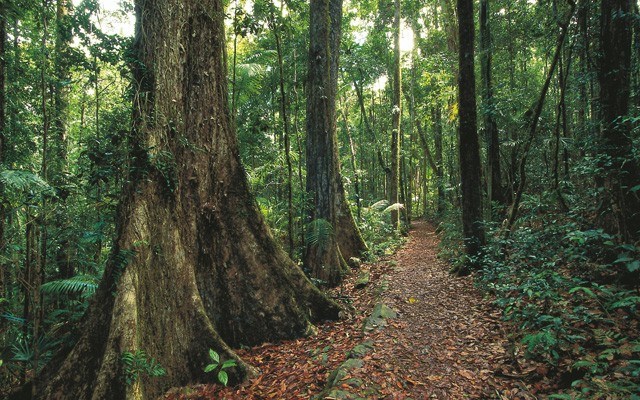What would living in a place without trees be like?" pondered local ecologist Bob Brett recently.
To which he immediately answered:
"It'd be awful."
His comments come on the heels of a new paper published this month in
Scientific Reports, in which researchers found neighbourhoods with trees are good for your health.
So good, in fact, that they found having 10 or more trees in a city block, on average, improves health perception in ways comparable to an increase in annual personal income of $10,000 and moving to a neighbourhood with $10,000 higher median income or being seven years younger.
The research also found that having 11 or more trees in a city block, on average, decreases cardio-metabolic conditions in ways comparable to an increase in annual personal income of $20,000 and moving to a neighbourhood with $20,000 higher median income or being 1.4 years younger.
This, at a time when more and more people are living removed from nature — a staggering 50 per cent of the global population now lives in towns and cities. That figure is projected to rise to 70 per cent by 2050.
At the same time, visitation rates for Canada's national parks have been declining over the past 20 years. Almost one-third of Canadian adults get little to no daily outdoor time; only six per cent of their time is spent outside. And Canadian youth too are spending an hour or less outside each day, on average.
A report prepared on the results of the 2015 David Suzuki 30x30 Nature Challenge, encouraging Canadians to get outside for 30 minutes for 30 days, states: "Nature contact may be undervalued and not considered as a source of personal happiness."
The recent tree study in Scientific Reports is focused on Toronto, combining high-resolution satellite imagery and individual tree data with questionnaire-based self-reports of general health perception, cardio-metabolic conditions and mental illnesses from the Ontario Health Study.
The study answers just how much a tree in the street, or a nearby neighbourhood park, can improve health.
"Our data and analysis do not answer why trees are beneficial, but based on other research, trees can improve health through reduction of air pollution, relieving stress, restoring attention, promoting physical exercise, etc.," wrote researcher Omid Kardan, a graduate student of psychology at the University of Chicago, who led the study, in an email to Pique.
The effects are stronger for "public trees."
When asked why, Kardan said: "We speculate that the reason is that they are more readily accessible to the largest population of people."
And so, Brett's first thought on reading about the study was... happiness.
"I'm happy I live in Whistler where we actually have access to real forests rather than individual trees on a boulevard," he said.
Brett remembered skiing with a Japanese family in the late '90s. That was the first time he had heard of Shinrin-yoku — the Japanese art of forest bathing. This involves visiting a forest for relaxation and recreation in order to reduce stress, anger, anxiety, depression and sleeplessness. It can also increase the immune defense system.
"It just clicked," said Brett. "That's exactly how I feel when I'm in an old-growth forest.
"I can't claim a physical health benefit from it, but I'd say that there's a feeling of calm from being near trees that have been standing for centuries. There's something very majestic about them."
Another recent U.S. study also found that being close to nature may actually ease the mind. The Stanford University research compared the effects of taking a nature walk through greenspace to a walk in an urban environment, specifically a busy California road.
The brain scans in participants on the nature walk showed reduced activity in an area of the brain linked to risk of mental illness.
It's studies like these that give more credence to the David Suzuki 30x30 Nature Challenge.
In the past four years, the challenge has inspired tens of thousands of Canadians to spend 30 minutes a day outside for 30 days.
Research shows that participants were sleeping better, felt calmer and less stressed after the challenge.
The results for the 2015 challenge are detailed in a report, consistent with the results from the two prior years of research.
It states: "...spending time in nature has benefits for mood and vitality, and nature contact is associated with greater awe, curiosity and fascination.
"Increasingly, research evidence suggests that a stronger connection with the natural world promotes physical and psychological well-being, as well as ecologically sustainable behaviour."
And so, Brett keeps his eye to the outdoors, studying Whistler's natural biodiversity.
"Everyone I know in Whistler seems to want to have trees around them and maybe that's one of the reasons why people come here," said Brett.
"If you're alone, or with friends, or mushrooming in an old growth forest, there's no doubt it's meditative and peaceful and... you might even find some tasty mushrooms!"




